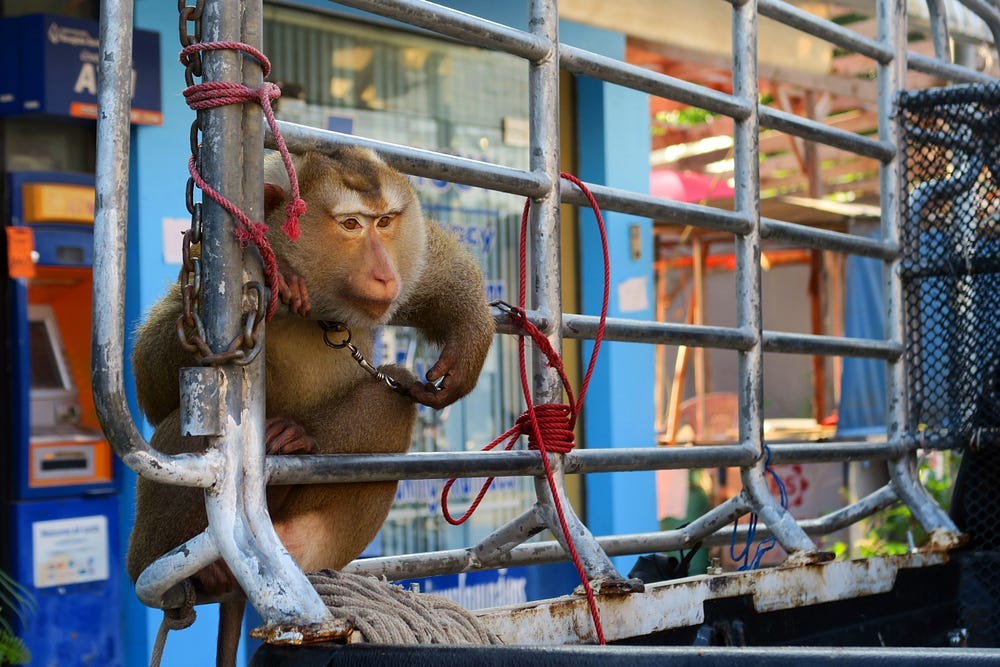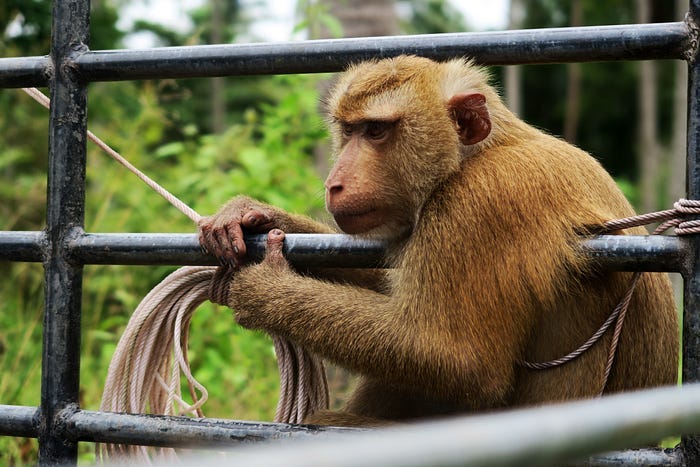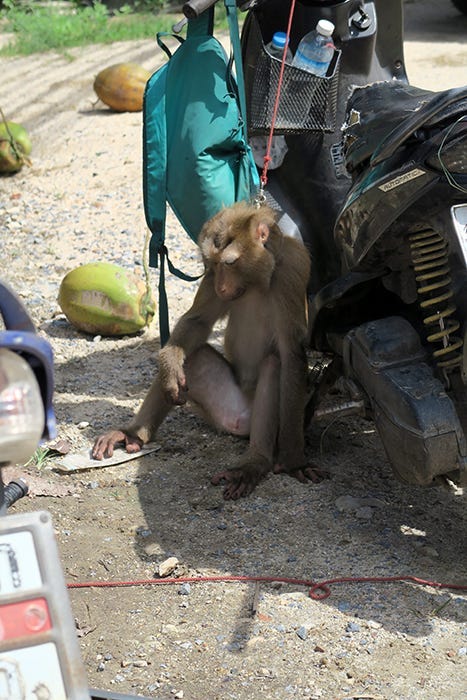Can a Local Wildlife Rescue End Monkey Coconut Slavery in Thailand?
Wildlife Friends Foundation Thailand has a solid plan to rescue the 3,000 macaques forced to pick coconuts, but they need our help!

Despite living in the Kingdom for many years, I had no idea that macaques were being enslaved and forced to pick coconuts in parts of Thailand until I moved to Koh Phangan and saw it with my own eyes.
On my way to a vegan restaurant, I saw a man holding a long rope tied to a macaque high in the coconut trees. He shouted commands in Thai, forcing the monkey to twist ripe coconuts free and drop them to the ground.

It was a common sight when I lived on the island. Every time I saw those slave monkeys, my heart broke. The macaques were always tied up and looked miserable.
I’m lucky to live in Hua Hin now, which is a beach town with a huge wild macaque population. I observed dozens of macaques when hiking in the nearby mountains.
They are very smart and social animals. They can live in troops of 16 to 70 monkeys. The troops I have observed were made up of at least 60 and separated themselves by age with the adults, juveniles, and babies in separate groups, each having two older macaques looking over each subtroop.
Forcing a monkeys to live alone with humans, tied up for life, and made to pick coconuts sounds like hell. It would be awful to do that to any species of animal.

In 2020, shortly after I started witnessing macaque slavery first-hand, PETA launched a first of a series of undercover investigations, of monkeys being forced to harvest coconuts. Many of these animals were poached from the wild as babies and forced to undergo cruel training at so-called “monkey schools.”
PETA’s latest video, where they investigated these schools, was released in December 2024. So this is still happening despite years of campaigning, but it has made an impact.
Because of PETA’s campaigns, many major international food companies, like HelloFresh and Costco, have stopped buying coconut milk from Thailand. The Bangkok Post reported in 2023 that PETA’s campaigns “caused huge damage to the Thai coconut milk industry and saw the country lose some of its 80% global market share.”
I covered this issue in my 2020 article, “Update on macaque monkey slavery in Thailand.”
In the article, I highlighted that even though most of the coconuts in Thailand are picked by humans and machines, some of the major coconut milk brands get their coconuts from different sources. This makes it very difficult to guarantee that none of the sources use monkey slave labor.
To try to combat this problem, the Department of Agriculture in Thailand said they would introduce a “Monkey Free Plus label” to ensure that certain brands didn’t use coconuts harvested from monkeys. But this was back in 2023 and I haven’t seen that label on any coconut products nor could I find a list of certified “Monkey Free Plus” Thai coconut companies anywhere on the internet.
So far, the only ethical coconut milk companies that I know of here are Nature’s Charm and Merit Foods. Thankfully, their products are easily available in major supermarkets here, but all Thai coconut milk should be cruelty-free by now.

Boycotts and petitions haven’t been enough to end monkey coconut slavery in Thailand. PETA launched its campaign 5 years ago, but according to Edwin Wiek, founder of the animal rescue Wildlife Friends Foundation Thailand (WFFT), about 3,000 macaques are still used as slaves in the coconut trade.
Wiek’s organization is doing something about it, though. WFFT is currently raising money to put an end to monkey slavery and according to its fundraising campaign, they are trying to buy land to build sanctuary facilities, “where coconut monkeys can recover from their trauma and retire.”
Having worked in wildlife rescue for over 25 years, I’ve seen a lot of suffering by wildlife and other animals as well, but seeing the practice of coconut picking by these animals continuing for so long…it needs to stop.
— Wiek said in a recent YouTube video for WFFT.
PETA is currently collecting signatures for a petition to send to the Thai government, urging them to shut down all monkey schools and make monkey coconut picking illegal, but that will not be enough to end the practice completely.
Raising awareness of monkey coconut slavery is important, but it’s only half the battle. A wildlife organization that understands Thai culture needs to work with authorities, coconut companies, and coconut farmers to end macaque slavery.
There also needs to be a plan in place to care for all the macaques rescued from the coconut industry.
For 24 years, WFFT has helped rescue thousands of wild and domesticated animals in Thailand. I have been following their work since I first moved to Thailand 15 years ago. Not only has WFFT provided shelter and veterinary care for abused wild animals, but Wiek has also spoken out against wildlife trafficking and even helped draft Thailand’s wildlife protection laws to crack down on wildlife abuse.
Their blog shows their history of helping injured and abused macaques over the years. I think if any organization can help finally end this practice, WFFT can since they have the resources and knowledge to help care for these enslaved macaques and can work with the Thai government and coconut industry directly, which is crucial in getting this cruel practice to finally end.
Please donate to WFFT to help end monkey abuse in the coconut industry if you can and share their campaign. Their fundraising video is also available on Instagram.

(This article was originally posted on Medium.)




